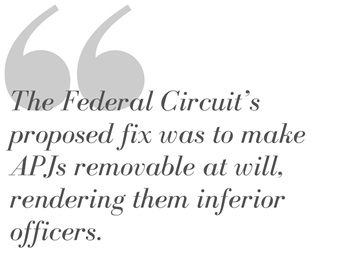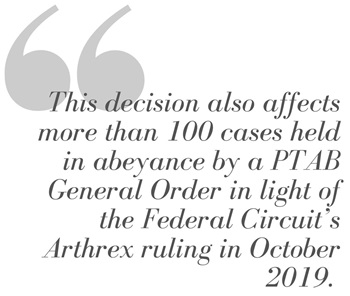United States V. Arthrex: Inter Partes Review Decisions Now Reviewable by the PTO Director
DOWNLOAD PDF- Artz, John S. Caloiaro, Steven A.
- Industry Alerts
Click “Subscribe Now” to get attorney insights on the latest developments in a range of services and industries.
On June 21, 2021, the Supreme Court issued its decision in United States v. Arthrex, which created a review process that gives the PTO Director the ability to independently review decisions rendered by Administrative Patent Judges (“APJs”) and issue, modify, or otherwise change those decisions on behalf of the Patent Trial and Appeal Board (“PTAB”). This new approach was formed in response to the Supreme Court’s conclusion that the unreviewable authority wielded by APJs during inter partes review (“IPR”) proceedings is constitutionally incompatible with their status as inferior officers.
In the underlying action, a PTAB panel made up of three APJs concluded that Arthrex, Inc.’s (“Arthrex’s”) patent was invalid after Smith & Nephew, Inc. and ArthroCare Corp. petitioned for an IPR and received a decision finding the patent invalid. Arthrex appealed the decision to the Federal Circuit, claiming that the structure of the PTAB violated the Appointments Clause because APJs were unconstitutionally appointed. Specifically, Arthrex argued that the President, not the Secretary of Commerce, must appoint APJs because, as constituted, they were principal officers and therefore needed Congressional approval.
 The Federal Circuit agreed with Arthrex and held that APJs were unconstitutionally appointed principal officers because neither the Secretary of Commerce nor the PTO Director had the authority to review their decisions or remove them at will. The Federal Circuit’s proposed fix was to make APJs removable at will, rendering them inferior officers.
The Federal Circuit agreed with Arthrex and held that APJs were unconstitutionally appointed principal officers because neither the Secretary of Commerce nor the PTO Director had the authority to review their decisions or remove them at will. The Federal Circuit’s proposed fix was to make APJs removable at will, rendering them inferior officers.
On review, the Supreme Court agreed that APJs were unconstitutionally appointed, but provided a different remedy. The solution offered by the Supreme Court makes decisions by APJs in IPR proceedings subject to review by the PTO Director, allowing him independently to reach a different conclusion. The PTO Director’s decision is still appealable, just as decisions delivered by APJs were before. The Supreme Court’s resolution thus allows the APJs to remain inferior officers, keeping the structure of the PTAB intact.
As for Arthrex, the Supreme Court remanded the case back to the PTO Director for the opportunity to decide whether to rehear the petition filed by Smith & Nephew, Inc. However, Arthrex is not entitled to a hearing before a new PTAB panel.
 This decision also affects more than 100 cases held in abeyance by a PTAB General Order in light of the Federal Circuit’s Arthrex ruling in October 2019. These cases involved PTAB decisions vacated by the Federal Circuit following its Arthrex holding. The Federal Circuit remanded these cases for a new PTAB hearing before a new panel that was constitutionally appointed. The PTAB stayed these cases and any other cases remanded to it under the Federal Circuit’s Arthrex ruling until the Supreme Court ruled on Arthrex. Now, the PTAB panels are not required to rehear any of their respective prior decisions, but the PTO Director must independently decide whether to review and potentially modify each final written decision. The Supreme Court did not layout guidelines for the additional review, but seemingly, left it open for the PTO to promulgate regulations for the required intra-agency appeal.
This decision also affects more than 100 cases held in abeyance by a PTAB General Order in light of the Federal Circuit’s Arthrex ruling in October 2019. These cases involved PTAB decisions vacated by the Federal Circuit following its Arthrex holding. The Federal Circuit remanded these cases for a new PTAB hearing before a new panel that was constitutionally appointed. The PTAB stayed these cases and any other cases remanded to it under the Federal Circuit’s Arthrex ruling until the Supreme Court ruled on Arthrex. Now, the PTAB panels are not required to rehear any of their respective prior decisions, but the PTO Director must independently decide whether to review and potentially modify each final written decision. The Supreme Court did not layout guidelines for the additional review, but seemingly, left it open for the PTO to promulgate regulations for the required intra-agency appeal.
Looking ahead to future IPR proceedings, the President-appointed PTO Director may have more influence over the PTAB and the underlying decisions made by APJs. Although it can be appealed to the Federal Circuit, the PTO Director now has the discretion to independently overturn IPR decisions, which as the Supreme Court pointed out, “billions of dollars can turn on."
Related Practices
Recent Insights
- Industry Alerts Sovereign Shield Does Not Extend to Inter Partes Reviews
- Industry Alerts Breaking News! Supreme Court Gives Patent Owners Big Win
- Conferences 22nd Annual Advanced Patent Law Institute on November 2-3, 2017
- October 28, 2024 Media Mentions John Krieger was recently quoted in the Los Angeles Times article, "The ‘Baby Reindeer’ case against Netflix could hinge on one line: ‘This is a true story’,”
- October 14, 2024 Media Mentions The San Diego Business Journal has quoted both Michael Hammer and Dr. Jing Liu in the article, “Drawn to San Diego for Life Science Practice.”
- October 11, 2024 In the News Andrea Arndt's article, "Patent Owners Beware: Expanded Jurisdiction Risks in Using Third-Party Platforms to Remove Infringing Listings," was published by IP Watchdog.
- October 11, 2024 Media Mentions Mike Hammer and Dr. Jing Liu have been quoted in the Law360 article, “Why Dickinson Wright Launched IP-Focused San Diego Shop.”
- October 10, 2024 In the News Inbound Logistics published Tripp Lake's article titled, "Protecting Supply Chain Trade Secrets."
- October 08, 2024 Media Mentions Law360 recently quoted Michael Hammer and Dr. Jing Liu in the article, "Dickinson Wright Opens San Diego Office."


